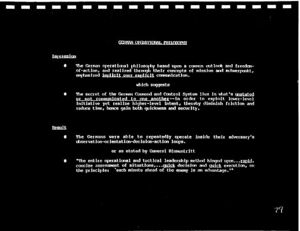Patterns of Conflict
| The works of |
| Works of John Boyd |
|---|
OODA WIKI Edition
Quantico Transcription
And if you look at their philosophy, here’s the key thing behind it. What they’re really doing, if you look at their whole operational philosophy, based upon a common outlook, freedom of action, realized through their concepts of mission, et cetera, they emphasize implicit over explicit communication.
In other words, since they have a common outlook, it’s like in a family, and you and I are good friends. I don’t have to give you detail what to do. I just give you an order or two, and you’re on your way. In other words, that one word is dripping with information, so you don’t have to say too much.
As a matter of fact, the British noticed that, that after a German unit came in the front lines, if it was a new unit, they’d talk a lot. After they got in there and were playing the problem, they’d get very quiet. You only had to give a few words to do stuff. In other words— in fact, even
Mellenthin sort of tips you off. He said, we finally worked in our signals so we could work together very well. He says it very often in his Panzer Battles.[1] They worked together long enough, he said, we finally worked our signals so we don't have to say a lot.
So it’s implicit over explicit, which suggests that the secret to a command and control system, it’s not what’s stated, but what’s unstated, at least in an explicit sense. That’s the secret. And by doing that, you can exploit lower-level initiative, yet realize high-level intent, thereby diminish friction and reduce time. Hence you gain both quickness and security because you’re not talking a lot.
We used to train fighter pilots that way out at Nellis. Initially they’re all jabbering all the time. So I’d take them up and work with them. And I said, I don’t want you to say a goddamn thing.
Nothing, if you can. They said we can’t do that. I said well, I want as few words as possible when you’re working together.
I want one word dripping with information because what happened, they’re talking so long, the events are unfolding faster than they can communicate, so the whole thing just welled away into disordered chaos. So we got them working together, so they developed that fingerspitzengefühl. They’d say a word or two, and everybody’s adjusting because everybody knew all the sequence that flowed behind that word.
And now, then, your communication is unfolding more rapidly than the events that are unfolding, now you’re in charge of events, instead of the events being in charge of you. But if you need detailed orders, the events are spilling out faster than your orders. Christ, you’re going to fall behind.
All you’re going to do is generate confusion and disorder, and the whole system is going to come unglued. As a matter of fact, that’s exactly what happened to the evacuation of Saigon. General Grey talked about that. Christ, they were pumping and changing his orders. And they were doing it at a pace that wasn’t fast enough for the events. And they were just confusing everybody.
Finally, everybody stopped looking at the goddamn machine and how they’re going to be evacuated. Old Grey likes to talk about that, General Grey. Some people were trying to fob that off as a smooth operation because they’re doing it through a computer. He says, I was on the other end of that. That was a total disaster.
Remember that time, Mike, when he criticized the Army general, some Army general’s trying to fob that off. He said, “I was there, were you, General?” He says, no. Let me explain it to you.
So by doing this, in my words, at least in the early part of the war, they were able to get inside their adversary’s OODA loop. Or as stated by General Blumentritt, I’m quoting him here, his statement, note what he’s saying there. And those are his underlines, which is almost like my OODA loop.
Note what he’s saying. “Hinged upon rapid” —he underlined it—“concise assessment of the situation.” That’s orientation. I already assume the observation. “Quick decision and quick execution.” There it is. Orientation, decision, execution. He just left out the word “observation.”
In other words, he’s already gotten that through intelligence elsewhere. Those are his words.
And note what he says. “Each minute ahead of the enemy is an advantage.” In other words, you’re pulling down his socks, rather than him pulling yours down. I found that after, I said, “isn’t that gorgeous.”
Let’s take a break. I’ll give you a five-minute break. We’ll come back and go through the rest of the blitzkrieg, and move on. We’ve taken a lot of time—
[Cross talking; tape stops, then starts again]
Lightfoot Transcription
- ↑ 33 Major-General F. W. von Mellenthin, ''Panzer Battles,'' 2nd ed.(New York, NY: Ballantine Books, 1985).
